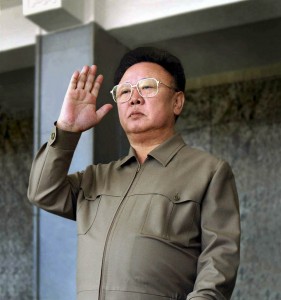Kim Jong Il dies at 69
North Korea announced the death of supreme leader Kim Jong Il and urged its people on Monday to rally behind his young son and heir-apparent, while the world watched for signs of instability in a nation pursuing nuclear weapons.
South Korea launched a high alert for its military as it faces the North’s 1,2 million-strong armed forces, while President Barack Obama and South Korean President Lee Myung-bak agreed by phone to closely monitor the events and cooperate.
People on the streets of the North Korean capital, Pyongyang, broke into tears as they learned the news that their “Dear Leader” had died at the age 69 of heart failure Saturday while carrying out official duties on a train trip.
“He passed away too suddenly to our profound regret” – said a statement carried by the North’s official Korean Central News Agency. “The heart of Kim Jong Il stopped beating, but his noble and august name and benevolent image will always be remembered by our army and people.”
While there was no immediate statement on official succession, there were clear indications that Kim’s 20-something son, Kim Jong Un, would be in charge.
The North said in a dispatch that the people and the military “have pledged to uphold the leadership of comrade Kim Jong Un” and called him a “great successor” of the country’s revolutionary philosophy of juche, or self reliance.
“At the leadership of comrade Kim Jong Un, we have to change sadness to strength and courage and overcome today’s difficulties” – North Korea said.
It was not immediately clear what effect Kim’s death would have on recent efforts to bring North Korea back into nuclear talks aimed at exchanging aid for commitments by the North to disarm.
Even as the world changed around him, North Korean leader Kim Jong Il remained firmly in control. Ruling absolutely at home and keeping the rest of the world on edge through a nuclear weapons program.
Inheriting power from his father, he led his nation through a devastating famine while frustrating the U.S. and other global powers with an on-again, off-again approach to talks on giving up nuclear arms in return for food and other assistance. Kim was one of the last remnants of a Cold War-era that ended years earlier in most other countries.
His death after 17 years as leader was announced Monday by state television two days after he died. North Korea’s news agency reported that he had died at 8:30 a.m. Saturday after having a heart attack on a train. Adding that he had been treated for cardiac and cerebrovascular diseases for a long time. He was 69.
He is widely expected to be succeeded by his third son in a nation that celebrates the ruling family with an intense cult of personality. On Monday, the North Korean news agency dubbed the younger Kim a ‘great successor’ as the country rallied around him as the next leader.
Kim’s longtime pursuit of nuclear weapons and his military’s repeated threats to South Korea and the U.S. have stoked fears that war might again break out or that North Korea might provide weapons of mass destruction to terrorist movements.
South Korea put its military on “high alert” and President Lee Myung-bak convened a national security council meeting after the news of Kim’s death. The Korean peninsula remains technically in a state of war more than 50 years after the Cold War-era armed conflict ended in a cease-fire.
Kim is believed to have suffered a stroke in 2008 but he had appeared relatively vigorous in photos and video from recent trips to China and Russia and in numerous trips around the country carefully documented by state media.
North Korea’s long-time leader Kim Jong Il has died of heart failure.
In a “special broadcast” today from the North Korean capital, Pyongyang, state media said Kim died of a heart ailment on a train due to a “great mental and physical strain” on Dec. 17, during a “high intensity field inspection”.
The broadcast said an autopsy was carried out on December 18 and “fully confirmed” the diagnosis on the 69-year-old.
Kim is believed to have suffered a stroke in 2008, but he had appeared relatively vigorous in photos and video from recent trips to China and Russia and in numerous trips around the country carefully documented by state media.
The communist country’s “Dear Leader” (reputed to have had a taste for cigars, cognac and gourmet cuisine) was believed to have had diabetes and heart disease.
“It is the biggest loss for the party … and it is our people and nation’s biggest sadness” – an anchorwoman clad in black Korean traditional dress said in a voice choked with tears.
She said the nation must “change our sadness to strength and overcome our difficulties”.
South Korean media, including Yonhap news agency, said Seoul had put its military on “high alert” and President Lee Myung-bak convened a national security council meeting after the news of Kim’s death.
The news came as North Korea prepared for a hereditary succession. Kim Jong Il inherited power after his father, revered North Korean founder Kim Il Sung, died in 1994.
In September 2010, Kim Jong Il unveiled his third son, the twenty-something Kim Jong Un, as his successor, putting him in high-ranking posts.
Traffic in the North Korean capital was moving as usual today, but people in the streets were in tears as they learned the news of Kim’s death.
Asian stock markets moved lower after the news, which raises the possibility of increased instability on the divided Korean peninsula.
South Korea’s Kospi index was down 3.9% at 1,767.89 and Japan’s Nikkei 225 index fell 0,8% to 8,331.00. Hong Kong’s Hang Seng slipped 2% to 17,929.66 and the Shanghai Composite Index dropped 2% to 2,178.75.
